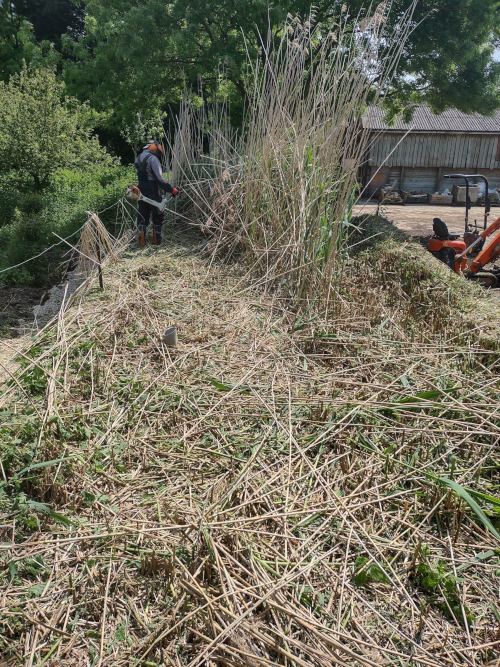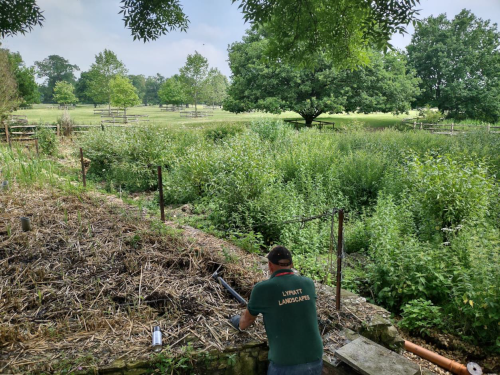Here’s a summary of part 2 of an interview (see video below for more details – well worth it!) with Julian Jones, a water engineer and distinguished fellow of the Schumacher Institute, who has worked and provided consultancy for water companies, NGOs, the Environment Agency, universities and governments. Julian lives in a village near Stroud, and Stroud Commons are talking with him about building a water commons for Stroud. Part 1 is here.
I’ve looked into some of your ideas, and they include sustainable ways of dealing with sewage, to produce compost, flood prevention and some electricity generation too, via hydro. And actually, ponds in which fish can be raised. So we’re talking water, sewage, soil improvement, irrigation, flood prevention, energy and food. It’s such a fantastic package. Why don’t the corporations do it?
It’s back to profit. We need true-cost accounting to take more than profit into consideration. It’s not just about taking risks with public health and unsafe wastewater treatment, it’s also about the degradation of our farmland and soil. The typical footprint of civilisation over the last 5000 years is to destroy soil. It’s a very familiar pattern, driven by centralised power and top-down hierarchies (that have been called ‘hydraulic empires’); and it’s produced mainly cereal-based monoculture farming, that has produced deserts in the ‘Fertile Crescent’ where civilisation was born.
We can do this vastly better ourselves, in our local communities. There are 5 new principles from DEFRA that we should have always followed, like ‘polluter pays’, solve problems at source, circular economy etc. We should have always done these things. But if these principles were applied to the current water industry, it would be brought down overnight. The quality, sedimentation and low base flows of our local rivers horrifies me. Stroud’s rivers were once renowned for consistent flows – which is why so many water mills were situated here. The higher echelons of the water companies don’t have the interest or the expertise to adhere to DEFRA’s principles.
Water21 worked on flood prevention in the Slad Valley outside Stroud, following terrible floods in 2007. We’d scoped out natural flood management and upstream attenuation, with storm storage reservoirs, and at every stage, the authorities tried to obstruct us. They did eventually come up with a scheme to attenuate flood waters upstream, similar to what we were proposing, but not until they’d spent most of the £500k budget on a plan to build two 30ft high concrete dams in an area of outstanding natural beauty that we knew wouldn’t be allowed. Just with the budget they used for scoping, we could have fixed the problem – and local farmers were supportive.
With the extra water storage, local farmers could have tried other forms of farming – like potatoes or root crops, that are better for the soil, better for us, and that can return four times the calories per acre than a grain crop.

Your ideas cover a huge amount of ground – water, sewage, energy, land, food, agriculture. How do we get there from where we are now?
Well it’s only going to happen if we get off our backsides and do it ourselves. Actually, to defend the water company that serves Stroud a little bit – they’ve installed 800 reed beds – which is more than all the other water companies combined. We provided the advice, and the regulator enforced it.
So the big water companies know that soft engineering solutions like reed beds work.
Yes, although in the case of the local water company, they were forced by the regulator. They challenged it, and it went to court. But we’ve had thousands of years of mismanagement of aquifiers, including here in the Cotswolds – and agriculture is the key villain (cutting down forests, draining wetlands etc.). It will take a long time to change the culture.
You, and your group, Water21, have the skills and experience to build a water commons – and we have a group of commoners in stroud who want to help you do it. but what resources do you need to do it?
I’m involved with two not-for-profit limited companies – Water21, which represents the community level of water interest and engagement, and Water21 Power Ltd. to provide the funds for the community work. We bring together old knowledge and new technology – sharing the vision for safe and viable water management, that’s sorely lacking. Even Stroud, known for it’s green image, it’s much the same as everywhere – a ‘flush and forget’ mentality. We can do the entire design process for a community.
New ideas are emerging that provide commons financing without debt. How much money would be needed, to even get started. And what else do we need? Where would we start – how would it work?
All the work at Water21, including posting and mentoring over 50 post-graduate students in the last 30 years, has come about through a mixture of goodwill and serendipity. Projects are often driven by enthusiastic members of local authorities, and every site is different. But we’re in competition here. There’s a very powerful water infrastructure in private ownership, but investing in a local system is frankly, a much safer investment than buying shares or even allowing your pension fund to invest in things like water companies, that are out of control. When you invest using the commons approach, in local services, it’s all immediately visible, and the funding process totally transparent. There aren’t lots of middle men taking their cut. Where there are sewage overflows, they’re an immediate risk to public health that need immediate action. There’s a lot of red tape of course – and in order to be able to bill customers, the costs of bureaucracy via OFWAT are comparable to the costs of the physical system. But in terms of the catastrophic mess that is the UK water sytem, the need for a test case in law for an alternative seems pretty evident. I’m not sure that the water companies have a case in law to enforce their bills – they’re in breach of Section 94 of the Water Acts and they’re failing to effectually drain huge areas of the UK, they’re threatening public health, and they’re badly affecting the climate crisis by failing to make use of nutrients.

Financing has always been a problem when it comes to bringing industries into common or community ownership. But these new commons ideas, based on the purchasing of, in effect, ‘future-use vouchers’ – in this case the provision of water and the removal of sewage – can provide a solution. We’re going to attempt to do that in Stroud. We’ve got a group of people who are meeting regularly in stroud to talk about building a water commons, a land commons and a food commons – these things are so interrelated that they’re inseparable really.
There are other groups too, looking into housing, finance, community spaces, energy, education and more. We’d like to invite people to contact us if they’d like to be involved in any of these groups.
And in all of those areas, this is a much safer way for people to invest their money than the corporate alternatives.
Thanks Julian. Great talking with you. We’ll see how this develops and we’ll talk again to keep people informed.


Leave a Reply